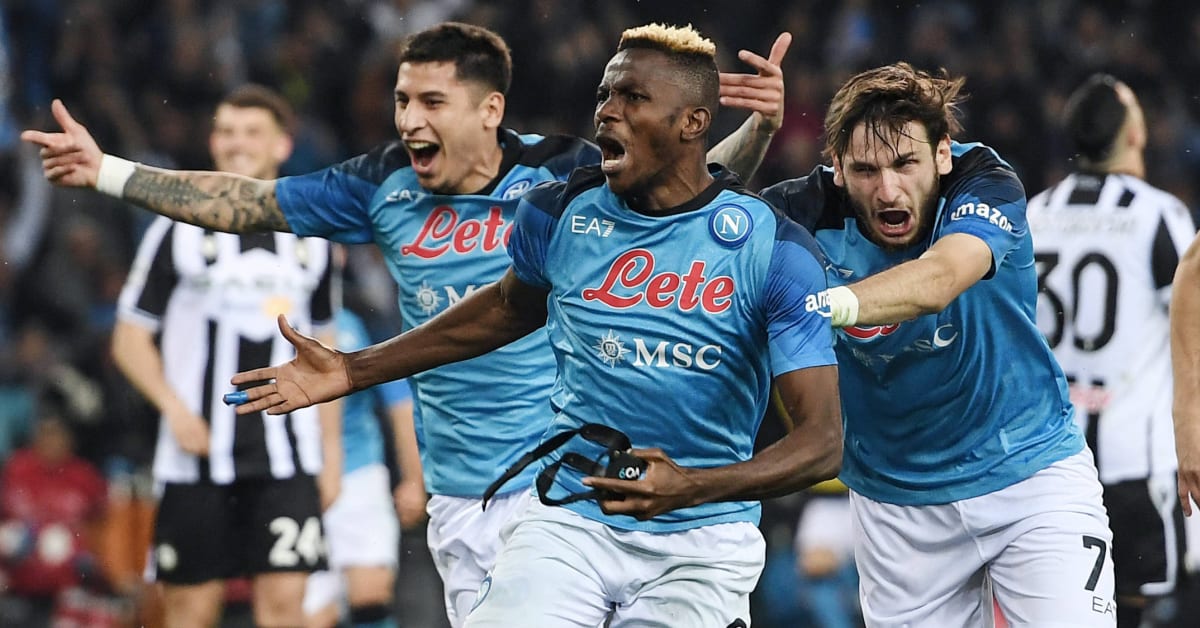
Napoli Quenches Decades-Long Thirst for Glory With Historic Serie A Title
For a little over half an hour it looked like Napoli’s Scudetto might be delayed again. A win on Sunday against Salernitana would have secured the title but an 83rd-minute equalizer left Napoli needing a point from its final six games. At Udinese it fell behind after 13 minutes, but Victor Osimhen’s calm side-foot finish seven minutes into the second half secured the vital 1–1 draw. The ball with which he scored the decisive goal was immediately whisked from pitch and placed in a velvet bag. It is a relic that will be venerated just as devoutly as any of the shrines of San Gennaro, the presiding saint of Naples.
At the final whistle in Udine, Napoli fans poured onto the pitch. Blue smoke rolled across the night sky. Manager Luciano Spalletti wept. Back in Naples, the Stadio Diego Armando Maradona was packed, the mood first nervous and then ecstatic. It feels like the celebrations have already been going on for weeks. Napoli has faltered of late, winning just two of its last eight games in all competitions, but the truth is the title was secured by a run of eight successive wins after defeat to Inter at the beginning of January. There might have been a wobble—and Napoli is a side that has wobbled when well-placed before—but that sequence ensured there would not be a collapse this year.
This was not expected. A lot of big names left last summer. Most notably there were Kalidou Koulibaly, Dries Mertens and Lorenzo Insigne, all of whom were aging, it’s true, but all of whom were also club legends. The departures of Fabián Ruiz, Arkadiusz Milik and David Ospina added to the sense of the end of an era. But it turned out the new era was better.
Victor Osimhen now looks one of the world’s best classical center forwards, a mobile and physically powerful player whose 22 goals are a record for an African in Serie A. Khvicha Kvaratskhelia, a Georgian picked up from Dinamo Batumi after he had left Russia when the war began, has dazzled on the wing. Kim Min-jae, signed from Napoli to replace Koulibaly, has been calmly commanding at center-back. Then there are those who have enjoyed a new lease of life: André-Frank Zambo Anguissa and Piotr Zieliński in midfield, Hirving Lozano on the right.
A lot of credit, clearly, goes to Spalletti, a coach who achieved great things with Roma 15 years ago. But after his two Russian league titles with Zenit, Spalletti had seen his subsequent achievements in taking Roma (again) and Inter into the Champions League slightly overlooked. His intensity and his tactical imagination have clearly found a home in Naples.

Osimhen’s 22 goals in the league this season have lifted Napoli to be among the best attacking teams in Europe.
Andrea Staccioli/IMAGO/Insidefoto
But because this is Naples, this is also a story about the past. It’s 33 years since Napoli’s previous title success, many of them traumatic. Diego Maradona had inspired the club’s only other titles, in 1987 and ’90. The season after the second of them, he tested positive for cocaine and never played for the club again. A downward spiral began. There were two relegations out of Serie A and, in 2004, bankruptcy. The club was bought by the film producer Aurelio De Laurentiis, who has overseen their rise from Serie C.
One might think that going from bankruptcy to a third league title in under two decades might have made De Laurentiis a hero to fans, but recently there has been tension between him and certain ultra groups. De Laurentiis is from Rome and has always been seen by some as an outsider, and there is almost a sense that this title, achieved by clever planning and astute business dealings, is less authentically Neapolitan than the two with the individual genius of Maradona.
A dispute over ticket prices and the role the ultras would play in the title celebrations led to the hardcore sitting in silence during the 4–0 league defeat to AC Milan a month ago, which in turn led to fights breaking out between the protestors and those happy with De Laurentiis’s methods. De Laurentiis has clearly tried to rein in the ultras, instituting, for instance, a now-abandoned policy of fining fans for not sitting in their assigned seats in 2019. A two-month ban on away fans following clashes with Roma fans at a service station in January led to the present mood of tension.
Although an uneasy peace was brokered, Spalletti threatened to quit if there was any repeat of the silent demonstration; there is an argument that the loss to Milan prepared the ground for Napoli’s exit to the same team in the Champions League quarterfinals. With Inter in the semifinal, this was a great chance for a final against Manchester City or Real Madrid missed; there was a time earlier this season when Napoli could realistically be said to be playing the best football in Europe.
That shadow will linger. This has been a great season for Napoli, one of the greatest in its history. The likes of Osimhen, Kvaratskelia and Kim deserve to be remembered alongside Maradona, Careca and Ciro Ferrara. But there will always be a nagging doubt that it might have been even better.





